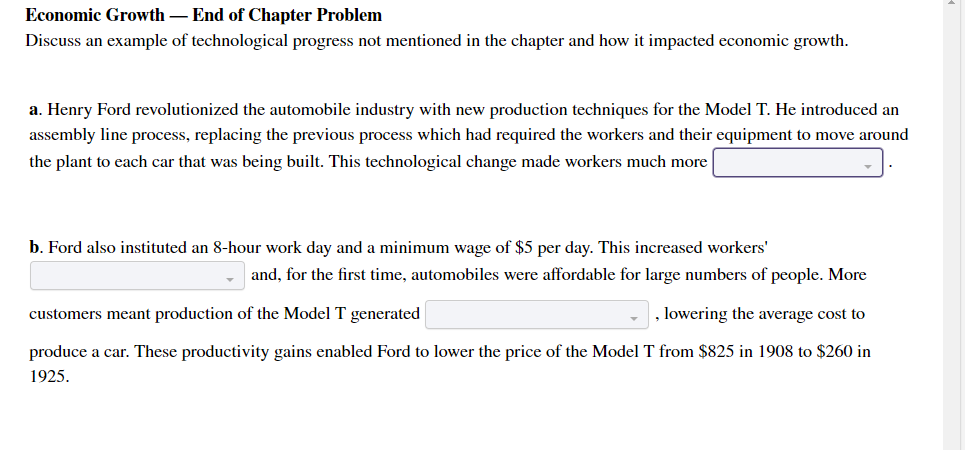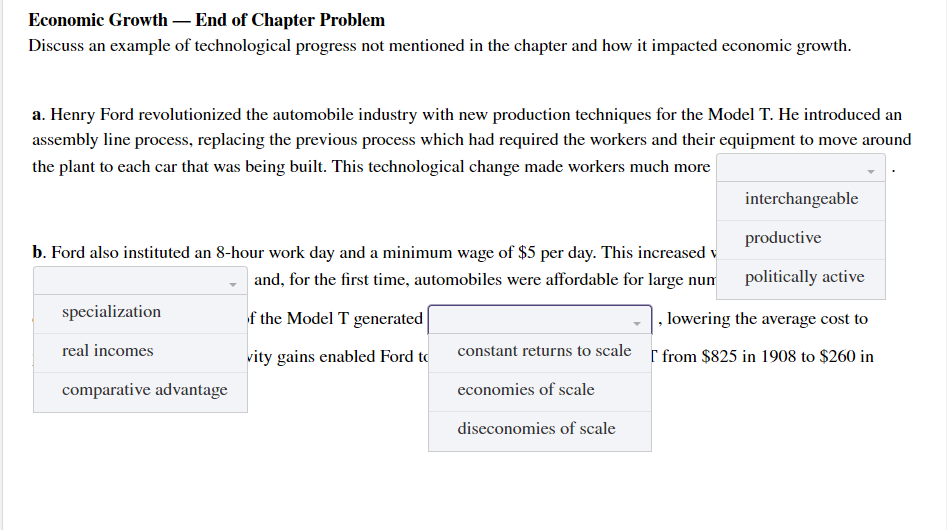Economic Growth – End of Chapter Problem Discuss an example of technological progress not mentioned in the chapter and how it impacted economic growth. a. Henry Ford revolutionized the automobile industry with new production techniques for the Model T. He introduced an assembly line process, replacing the previous process which had required the workers and their equipment to move around the plant to each car that was being built. This technological change made workers much more b. Ford also instituted an 8-hour work day and a minimum wage of $5 per day. This increased workers' and, for the first time, automobiles were affordable for large numbers of people. More customers meant production of the Model T generated , lowering the average cost to produce a car. These productivity gains enabled Ford to lower the price of the Model T from $825 in 1908 to $260 in 1925.
Economic Growth – End of Chapter Problem Discuss an example of technological progress not mentioned in the chapter and how it impacted economic growth. a. Henry Ford revolutionized the automobile industry with new production techniques for the Model T. He introduced an assembly line process, replacing the previous process which had required the workers and their equipment to move around the plant to each car that was being built. This technological change made workers much more b. Ford also instituted an 8-hour work day and a minimum wage of $5 per day. This increased workers' and, for the first time, automobiles were affordable for large numbers of people. More customers meant production of the Model T generated , lowering the average cost to produce a car. These productivity gains enabled Ford to lower the price of the Model T from $825 in 1908 to $260 in 1925.
Chapter3: Scarcity, Trade-offs, And Production Possibilities
Section: Chapter Questions
Problem 11P
Related questions
Question

Transcribed Image Text:Economic Growth – End of Chapter Problem
Discuss an example of technological progress not mentioned in the chapter and how it impacted economic growth.
a. Henry Ford revolutionized the automobile industry with new production techniques for the Model T. He introduced an
assembly line process, replacing the previous process which had required the workers and their equipment to move around
the plant to each car that was being built. This technological change made workers much more
b. Ford also instituted an 8-hour work day and a minimum wage of $5 per day. This increased workers'
and, for the first time, automobiles were affordable for large numbers of people. More
customers meant production of the Model T generated
, lowering the average cost to
produce a car. These productivity gains enabled Ford to lower the price of the Model T from $825 in 1908 to $260 in
1925.

Transcribed Image Text:Economic Growth – End of Chapter Problem
Discuss an example of technological progress not mentioned in the chapter and how it impacted economic growth.
a. Henry Ford revolutionized the automobile industry with new production techniques for the Model T. He introduced an
assembly line process, replacing the previous process which had required the workers and their equipment to move around
the plant to each car that was being built. This technological change made workers much more
interchangeable
productive
b. Ford also instituted an 8-hour work day and a minimum wage of $5 per day. This increased v
and, for the first time, automobiles were affordable for large num politically active
specialization
f the Model T generated
| , lowering the average cost to
real incomes
vity gains enabled Ford to
constant returns to scale r from $825 in 1908 to $260 in
comparative advantage
economies of scale
diseconomies of scale
Expert Solution
Step 1
a)Because of technological change,productivity of worker increases.
Therefore answer is productivity.
Trending now
This is a popular solution!
Step by step
Solved in 2 steps

Knowledge Booster
Learn more about
Need a deep-dive on the concept behind this application? Look no further. Learn more about this topic, economics and related others by exploring similar questions and additional content below.Recommended textbooks for you

Exploring Economics
Economics
ISBN:
9781544336329
Author:
Robert L. Sexton
Publisher:
SAGE Publications, Inc

Brief Principles of Macroeconomics (MindTap Cours…
Economics
ISBN:
9781337091985
Author:
N. Gregory Mankiw
Publisher:
Cengage Learning

Essentials of Economics (MindTap Course List)
Economics
ISBN:
9781337091992
Author:
N. Gregory Mankiw
Publisher:
Cengage Learning

Exploring Economics
Economics
ISBN:
9781544336329
Author:
Robert L. Sexton
Publisher:
SAGE Publications, Inc

Brief Principles of Macroeconomics (MindTap Cours…
Economics
ISBN:
9781337091985
Author:
N. Gregory Mankiw
Publisher:
Cengage Learning

Essentials of Economics (MindTap Course List)
Economics
ISBN:
9781337091992
Author:
N. Gregory Mankiw
Publisher:
Cengage Learning

Principles of Economics 2e
Economics
ISBN:
9781947172364
Author:
Steven A. Greenlaw; David Shapiro
Publisher:
OpenStax


Economics: Private and Public Choice (MindTap Cou…
Economics
ISBN:
9781305506725
Author:
James D. Gwartney, Richard L. Stroup, Russell S. Sobel, David A. Macpherson
Publisher:
Cengage Learning